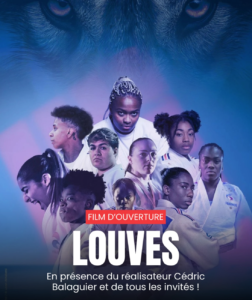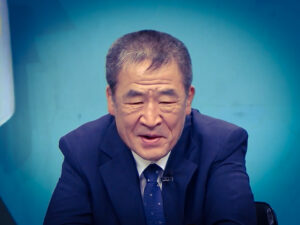London, July 31, 2012. Two hours before entering into her second Olympics, Gévrise Emane has a panick attack. How did the French woman managed to deal with this mental situation behind closed doors, and still ended with bronze around her neck? Let’s turn back on one of these endless days when it’s only at nightfall that the sun, at last, starts to rise. – JudoAKDReplay#002.
[FRA – Cet article est une reprise de la version anglaise originale d’un papier publié en janvier 2020 dans le bimestriel français L’Esprit du judo. Cette version anglaise a été mise en ligne le même mois dans l’ancienne version du site Internet de l’EDJ et reprise par le site JudoInside, mais n’était plus visible depuis la mise à jour dudit site à l’automne 2020. Le voici à nouveau.
ENG – This article is a reprint of the English and original version of an article published in the French bimonthly L’Esprit du judo in January 2020. This English version was put online the same month on the old version of the EDJ website and taken over by the JudoInside website, but no longer appeared since the redesign of the said site in Autumn 2020. Here it is again.]

When her thick-hemmed socks enter the London ExCeL Arena tatami on this last Tuesday of July 2012 at dawn, Gévrise Emane is a kind of U63kg version of Serena Williams. Reigning World and double European champion, double winner of Paris Grand Slam, her 44 winnings over 45 matches during her last ten international and team competitions gives her a much bigger aura than her one meter sixty two height. Clarisse Agbegnenou, her ten-years-younger-promising national rival, didn’t cut the weight in January for the Almaty Masters and got conveniently suspended by the French Federation – seven years and four World titles later, the young talent had done more than catching up with her… Gévrise’s first match opponent is Gemma Howell. The British is fighting at home. Three months before, she definitely moved up from the U57kg category. With four titles out of five podiums since that, she’s in good form. But the 22-years old’s experience is light years behind the one of her uncompromising elder, who turned 30 the day of the Opening ceremony. Last but not least, youngsters like Priscilla Gneto on Sunday then Automne Pavia and Ugo Legrand on Monday already opened the tricolor timer. This truly relieved Gévrise’s patriotic sense of duty… Despite all this, on that Tuesday morning, at the end of the warm-up protocol she ought to have perfectly controlled with its physical and mental climbs, Gévrise walks into the locker room’s washroom. She puts water on her face, looks up, stares at herself a few seconds in the mirror… And bursts into tears.
Beijing begins. “You have to look four years back to understand those sudden tears” she says… So. Beijing Olympic Games, Wednesday August 13, 2008. Aged 26, Gévrise starts her first Olympics with the sticker of favourite of the U70kg, her current category. Reigning World and double European champion, winner of her first ever Paris Tournament earlier in the season, all the lights are bright green. For her first match, she fights Leire Iglesias from Spain, vice continental champion four months earlier and winner in Paris too, the year before. Their head-to-head is one victory each. “It was a very dynamic fight, with a lot of rhythm and tension”, says Javi Alonso’s student, 30 years old at that time, who became later a nurse in an Alicante hospital. “Gévrise was a very explosive judoka. My plan was to be faster than her. I had to attack within her attacks and, overall, I had to avoid even the smallest mistake.” And so she did. At the end, a shido sent the Spanish woman to quarterfinal and the French six feet under. “It took one year to one year and a half” confesses the Levallois Sporting Club fighter before she surfaced back up from that inner crater.
Face to faith. Right after Beijing calls for a complete reset of her basics. On the convalescent’s workbench, the prime suspect of this Chinese rout is obvious: herself. Viewing on screen her August 13th-match is a necessary evil. Surprise: Gévrise finds herself “far less rubbish” than she remembered. “I was good, but not as booming as I was supposed to be”. Present by her side, her coach Cathy Fleury has a concrete diagnosis. She knows exactly where the mistake lies. “Your diesel start-up. At a fight or even at championships scale. You have to work on it, and quickly.” Her doctor’s prescription holds in a few lines: “in almost each training session, I picked myself her first opponent. A girl, from her category or not, but a girl who is not here for a chat and who challenges her for real. She had the warm-up to get ready with the idea and, most of the time, the fight was on stage and umpired” explains the experienced former Olympic and World champion. “Our aim was to turn that moment when Gévrise enters the arena into a commonplace. To desacralize it. Devoted to what she could leash and only this, she allowed herself a real (re)discovery: how lucky she should feel about experiencing each stage of a champion’s privileged life.”
A world into words. Another lever got exposed by the Beijing’s wrecking: how difficult is to verbalize. Because if pleasure is a powerful engine for such a catching-and-shining-smile extrovert such as Gévrise, doubts are harder to expresse. Is it because of humility? Education? Either at Levallois or at Insep, her long conversations with Magali Baton, former world medallist who became mental trainer, or her sessions with her psychiologist Meriem Salmi, contributed to put words on some weaknesses she didn’t even dare facing until that day. Her Olympic-level-imposture complex, her rank in the much close-knit Emane’s clan, her studies choices, what her light owes to her shadow… That journey is complex, delicate, but it makes her grow. The “No more Beijing” mantra leads her all along that Olympic cycle. An Olympic cycle which saw her changing down to the U63kg in July 2009, when Lucie Décosse moved up to the U70kg category. “Let’s say it clearly: my aim wasn’t to avoid Lucie but to turn a page. As I was already light for the U70kg category, moving up to the U78kg was nonsense.”

The wall. So. Back to London, that morning. On the way to the stadium, Marie-Josée Emane had already warned Christian Chaumont of her older sister’s burst of stress. The Levallois SC coach hence repeated to “Gev’” she had “nothing to prove”, that this competition was “just one more competition” and that, at worst, she could trust the “tough physical preparation done together”… Despite this, tears spurted out. But if there is one lesson Gévrise learned from Beijing, it is from the mistake she made that day. When she believed that she could bear alone such emotional charge, which fell again on her shoulders like a three hundred kilos piano. So she crosses the mat and goes to find Martine Dupond: “Martine, I feel bad. I need you.” This sentence, her national referent was waiting for it. Two years earlier, at the Tokyo World Championships, she heard exactly the same words from Frédérique Jossinet’s mouth. The U48kg was so exhausted, down and disappointed after having been thrown on kata-guruma by Romanian Alina Dumitru, the reigning Olympic champion of their category, while the French woman was leading by two yukos to one at seven seconds to the end of their quarter final. “We had anticipated that contingency”, says the technician. “I told her: if you feel the thing rising, I will be there. And it happened…” Should she confront her? That’s not quite her style. Better appease her. De-dramatize. Show to her protégée videos to remind her the real ascendant she has on each of her opponents of the day. Laugh, even. In one word, to prove to her Martina Navratilova’s famous sentence right: “A champion isn’t known by his ability to win when he plays well, but by his capacity to win when he plays bad.”
Not alone but all one. That London’s epic? Five fights, one hansokumake, four golden scores, zero impact and flags rising up her way three times out of four. A staff and family overwhelming support, too. Happiness? “No. A major relief to have finally finished it” she laughs, proving wrong those who labelled her the “either first, either first round” girl, since she had moved down to the U63kg category. This time Gévrise went all the way to the end, yes, but to the end of herself… “Each one moves on with oneself”, philosophizes that champion who achieved to win both the European and the World title again in her former category of the U70kg in the next Olympiad. “It’s in Astana ‘15 then in Rio ’16 that finally I felt in peace. My only Olympic medal isn’t of the metal I expected but, deep inside, I know her right price. This bronze medal, trust me, is worth is weight in gold”. – Anthony Diao, winter 2020. Opening picture: ©Paco Lozano.

More Replays in English:
- JudoAKDReplay#001 – Pawel Nastula – The Leftover (2017)
- JudoAKDReplay#003 – Lukas Krpalek – The Best Years of a Life (2019)
- JudoAKDReplay#004 – How Did Ezio Become Gamba? (2015)
- JudoAKDReplay#005 – What’s up… Dimitri Dragin? (2016)
- JudoAKDReplay#006 – Travis Stevens – « People forget about medals, only fighters remain » (2016)
- JudoAKDReplay#007 – Sit and Talk with Tina Trstenjak and Clarisse Agbégnénou (2017)
- JudoAKDReplay#008 – A Summer with Marti Malloy (2014)
- JudoAKDReplay#009 – Hasta Luego María Celia Laborde (2015)
- JudoAKDReplay#010 – What’s Up… Dex Elmont? (2017)
More articles in English:
-
- JudoAKD#001 – Loïc Pietri – Pardon His French
- JudoAKD#002 – Emmanuelle Payet – This Island Within Herself
- JudoAKD#003 – Laure-Cathy Valente – Lyon, Third Generation
- JudoAKD#004 – Back to Celje
- JudoAKD#005 – Kevin Cao – Where Silences Have the Floor
- JudoAKD#006 – Frédéric Lecanu – Voice on Way
- JudoAKD#008 – Annett Böhm – Life is Lives
- JudoAKD#009 – Abderahmane Diao – Infinity of Destinies
- JudoAKD#010 – Paco Lozano – Eye of the Fighters
- JudoAKD#011 – Hans Van Essen – Mister JudoInside
- JudoAKD#021 – Benjamin Axus – Still Standing
- JudoAKD#022 – Romain Valadier-Picard – The Fire Next Time
- JudoAKD#023 – Andreea Chitu – She Remembers
- JudoAKD#024 – Malin Wilson – Come. See. Conquer.
- JudoAKD#025 – Antoine Valois-Fortier – The Constant Gardener
- JudoAKD#026 – Amandine Buchard – Status and Liberty
- JudoAKD#027 – Norbert Littkopf (1944-2024), by Annett Boehm
- JudoAKD#028 – Raffaele Toniolo – Bardonecchia, with Family
- JudoAKD#029 – Riner, Krpalek, Tasoev – More than Three Men
- JudoAKD#030 – Christa Deguchi and Kyle Reyes – A Thin Red and White Line
- JudoAKD#031 – Jimmy Pedro – United State of Mind
- JudoAKD#032 – Christophe Massina – Twenty Years Later
- JudoAKD#033 – Teddy Riner/Valentin Houinato – Two Dojos, Two Moods
- JudoAKD#034 – Anne-Fatoumata M’Baïro – Of Time and a Lifetime
- JudoAKD#035 – Nigel Donohue – « Your Time is Your Greatest Asset »
- JudoAKD#036 – Ahcène Goudjil – In the Beginning was Teaching
- JudoAKD#037 – Toma Nikiforov – The Kalashnikiforov Years
- JudoAKD#038 – Catherine Beauchemin-Pinard – The Rank of Big Sister
- JudoAKD#039 – Vitalie Gligor – « The Road Takes the One Who Walks »
- JudoAKD#040 – Joan-Benjamin Gaba and Inal Tasoev – Mindset Matters
- JudoAKD#041 – Pierre Neyra – About a Corner of France and Judo as It is Taught There
- JudoAKD#042 – Theódoros Tselídis – Between Greater Caucasus and Aegean Sea
- JudoAKD#043 – Kim Polling – This Girl Was on Fire
- JudoAKD#044 – Kevin Cao (II) – In the Footsteps of Adrien Thevenet
- JudoAKD#045 – Nigel Donohue (II) – About the Hajime-Matte Model
- JudoAKD#046 – A History of Violence(s)
- JudoAKD#047 – Jigoro Kano Couldn’t Have Said It Better
- JudoAKD#048 – Lee Chang-soo/Chang Su Li (1967-2026), by Oon Yeoh
And also :
- JudoAKDRoadToLA2028#01 – Episode 1/13 – Summer 2025
- JudoAKDRoadToLA2028#02 – Episode 2/13 – Autumn 2025
JudoAKD – Instagram – X (Twitter).



